| In 1770 Ioannis
Vlachos (1730-1771) - also known as Daskalogiannis - commenced a rebellion
against the Turks who had occupied Crete100 years earlier.
|
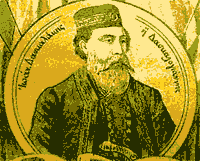
|
| Daskalogiannis was a wealthy
ship owner from Anopoli. He had four ships on which he travelled
around the Mediterranean. In addition to wealth, the cruises gave him
knowledge of new concepts and trends from other parts of the world.
|
|
|
|
|
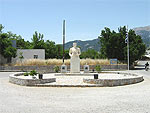 |
At the age of only 20 he got
his first public office. Later, in 1765, he became the leader of the
province and bore - together with his brother Nikolós Sgouromállis - the
responsibility for the payment of taxes to the Turks.
|
|
|
| On one of his voyages he met
Theodor Orlof on the Peloponnese. Orlof was sent out by the Russian
empress Catherine the Great to incite the Greek population to rebel
against the Turks. Daskalogiannis let himself be persuaded to rebel in
Crete after having been promised assistance from Russia.
|
| Daskalogiannis, knowing
perfectly well that it was impossible to unite the whole of Crete,
concentrated on the district where he came from. But to begin with even
the Sfakiots were difficult to persuade.
|
| In his "The Song of
Daskalogiannis", Barba-Pantzelios describes very vividly the
discussions between Daskalogiannis and his uncle who was the rural dean of
Sfakia:
|
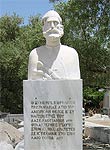
|
|
Then
the rural dean shook his head,
he was pensive, he foresaw much in his thoughts.
"Teacher Giannis", he said, "come to your senses,
you assume responsibility for all the people of Crete.
You make Sfakia into a centre which it ought not be,
and all the pashas and the Turks will assemble here.
Before the ships with the Moscowits come with reinforcements,
there will not be one single house left for the Sfakiots to live in"
. . .
|
|
|
|
| Barba-Pantzelios was a poor
cheese maker from the village of Mouri north east of Anopoli. He could
neither read nor write, and without the shepherd Sifis Skordilis, who
wrote down Pantzelios' song in 1786, it would have been lost for ever. At
the end of the song, Sifis and the details of the writing down are
introduced:
|
|
I,
Sifis Skordilis, who read aloud in the church,
began to write down the story with words and in verse,
and every single day I wrote a little,
while I lived at Papoura out near Giverto.
I lived at Papoura where I milked my sheep,
and spent time with Barba-Pantzelios who boiled the milk into cheese.
I had paper and moreover a pen,
and I wrote down the verses one by one while he talked ...
He talked in a song, for he is a verse maker,
having received the greatest gift from God.
|
|
|
|
|
| Daskalogiannis did, however,
manage to gather about 2.000 men, and in the spring of 1770 they attacked
the areas of Kydonia, Apokoronas and Agios Vasilios, north east of Lefka
Ori. Luck was with the rebels at first, and they put the Turks to flight,
but in a matter of only a short time the Turks had gathered together their
troops again, and as early as May they had an army of 15.000 men ready at
the village of Vrysses.
|
| When the Turks attacked
Daskalogiannis and his men on the Krapi plateau, the rebels suffered a
crushing defeat and had to take refuge in the high mountains. The Turks
held the rebels in check, while they destroyed many of the villages in the
area, scattered the inhabitants' flocks of sheep to the winds, looted the
province, and captured many inhabitants and sold them in the slave market
in Chándakas (Iraklion). Daskalogiannis' uncle, the rural dean, was also
taken prisoner, and he was probably forced to reveal Daskalogiannis'
plans. |
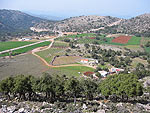
|
|
|
|
|
|
| The
following winter was hard, and many of the rebels lost courage. The
promised Russian help which did not arrive, was also a contributory factor
in the despondency.
|
| On 18th March 1771 the Turks
gave the rebels an ultimatum. If they surrendered they would be granted
safe passage, but the ultimatum was simultaneously accompanied by a
document with peace terms. The document contained 12 items:
|
| 1. They were to pay the taxes they had refused to pay the year
before. |
| 2. They were to surrender their arms and provisions. |
| 3. They were to surrender their leaders, who would be taken to Iraklion
for legal proceedings. |
|
4.
They were no longer to have neither contact with nor provision the
Christian ships approaching their harbours. |
| 5. They were to assist in arresting the crews on the Christian ships and
take them to Iraklion. |
| 6. The judiciary in Sfakia was to be managed by a justice of
the peace appointed by the Turkish government in Iraklion. |
| 7. The churches were not to be either repaired or restored. As were no
new churches to be built. |
| 8. They were to pay tithe according to the sultans' firman (statutory
instrument). |
| 9. No tall houses (castle towers) were to be built, and no
Christian symbols were allowed on the existing buildings. |
| 10. It was prohibited to hold
religious celebrations, as was ringing forbidden. |
| 11. The captured Muslims were
to be released. |
| 12. The Sfakiots were to wear
the specific clothes for subjugated Greeks. |
|
|
|
|
|
| When Daskalogiannis realized
that the battle was lost, he surrendered to the Turks in the hope that it
would ease the situation for his compatriots. It is also said that his
brother, Nikolós Sgouromállis, who had already been taken prisoner, was
forced to write him a letter in which he pointed out the Turks' good will.
|
| Daskalogiannis was taken to
Iraklion together with his most trusted men, but - in defiance of his
promises - the pasha of the town had already invented a cruel punishment. On 17th June 1771
Daskalogiannis was, in the full daylight of publicity, beaten to death in
the presence of his pinioned brother.
|
| After just under three years of
captivity in the Koules fortress in Iraklion, the rural dean and the other
rebels managed to escape.
|
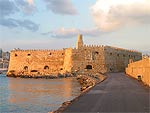
|
| The rural dean took refuge in a
cave in the Rouvas wood, while the others returned to the ruined Sfakia.
|
|
|
|
|
|
|
|




